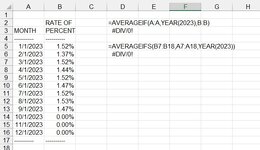JohnZ1156
Board Regular
- Joined
- Apr 10, 2021
- Messages
- 160
- Office Version
- 2021
- Platform
- Windows
I'm trying to get the average interest rate YTD based on the date in column A.
I have many more months and years in the spreadsheet besides only 2023.
If the month and year in column A is 2023, for example, average all the months with interest greater than 0.
NOTE: There are formulas for future months that right now return Zero.
I tried both AVERAGEIF and AVERAGEIFS and I'm getting #DIV/0!
Obviously, I'm doing something wrong.
I have many more months and years in the spreadsheet besides only 2023.
If the month and year in column A is 2023, for example, average all the months with interest greater than 0.
NOTE: There are formulas for future months that right now return Zero.
I tried both AVERAGEIF and AVERAGEIFS and I'm getting #DIV/0!
Obviously, I'm doing something wrong.






